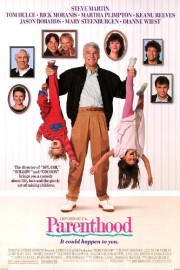Parenthood
I’ve never been a parent myself (yet, at least), but I can definitely appreciate the stresses and anxieties that all the characters go through in Ron Howard’s great comedy, “Parenthood.” In reality, though, this review should be getting written by a parent, many of whom I’m sure might see a lot of themselves in the universal issues brought up in Lowell Ganz and Babaloo Mandel’s insightful, hilarious screenplay. For now, though, you’ll have to live with my thoughts on the film.
The film’s primary star is the great Steve Martin as Gil Buckman, but this is the definition of an ensemble movie. Starting with Mary Steenburgen (as Gil’s wife), Rick Moranis, and Dianne Wiest, we have plenty of parents, sons, daughters, and grandparents to follow through the ups and downs of life. Howard has always had a gift for not shortchanging actors when it comes to large casts, and this is no exception; the film focuses more on Gil and his family, where his oldest son, Kevin, is dealing with anxiety and emotional issues, but we see plenty of the rest of the Buckman clan. Gil may be dealing with problems (exasperated by his work situation, and Kevin’s school wanting to put him in special ed), but not nearly as many as his sister, Helen (Wiest), who’s coming out of an ugly divorce, and it’s had an effect on not only her but her children, Julie (Martha Plimpton, who’s now dealing with parenting from the other side on TV’s “Raising Hope”) and Garry (Joaquin Phoenix, known at the time as Leaf). Julie is going through interesting times with her boyfriend, Tod (Keanu Reeves, in one of the film’s most surprising performances), during which they take risque photos of themselves; move in together, and get married; break up; move in with Helen; then look on the outs just as Julie gets pregnant, and Helen faces the prospect of being a grandmother, all the while trying to relate to Garry, who’s been sullen and distant since the divorce.
If the film focused on just those two, there would be enough drama and humor and heart and insight for an above-average Hollywood comedy. But Howard, who co-conceived the story with Ganz and Mandel, has some profound things they have to say about parenthood. The most heartbreaking decisions have to be made by Jason Robards’s character, Frank (Gil and Helen’s father), when his youngest son, Larry (played by Tom Hulce), makes his way into town with his son, Cool, who was left on his doorstep one day. Larry has always been the misfit, always getting into one “get rich” scenario after another, but also getting in trouble when he gambles. Now, he’s brought his lack of responsibility to his father’s doorstep, and it makes for some tense times between father and son, and tough choices for Frank. Frank was never a terribly great father, which Gil has vivid memories of, but he shows his true colors when he offers his help to Larry, but also understands that sometimes, he has to let Larry go his own way, and learn responsibility on his own. Robards and Hulce have some great moments, and the shots of Robards when he realizes he has to let Larry go, and that he and his wife are going to be taking care of Cool, are powerful.
There’s one more pairing, though, and it’s with Susan (Harley Kozak)– who is Gil, Helen, and Larry’s sister –and her husband Nathan (Rick Moranis), and the tensions they endure as they try to bring up their daughter, Patty. Nathan is all about starting advanced learning at an early age, but the longer Susan goes, the more she’s uncertain as to whether that approach is the best one for their daughter. If there’s a storythread that feels “tacked on” in the movie, it’s this one, and indeed, it seems to get the least amount of screentime in the movie, but it’s handled beautifully by Howard and the actors, all of whom make it matter just as much as the bigger stories in the film. It’s also great to see Martin and Moranis (who were, at the time, arguably the biggest stars in the cast) play off each other as we see them both struggle with whether their parenting methods are working or not.
In the end, though, it’s Gil’s anxieties, and parental difficulties, that stick out the most, mainly because, from what I’ve gathered, they’re the ones reflected most in the real lives of parents I know. The pull between professional and financial responsibilities and personal well-being, and the family we want to spend time with; the tough decisions that come with worrying about children, and how to raise them right; and even the choice of whether to bring another one into the mix, and ride that roller coaster yet again. All of the other stories in “Parenthood” have hard truths and warm feelings in them (including one coming from Tod, in one of the film’s most emotional exchanges), but Gil’s story is the one I think most people identify with most, and Martin and Howard bring all their comedic, and storytelling, savvy to making it feel as authentic as possible. I believe every second, and it’s an amazing accomplishment for director, writers, and actors alike.










